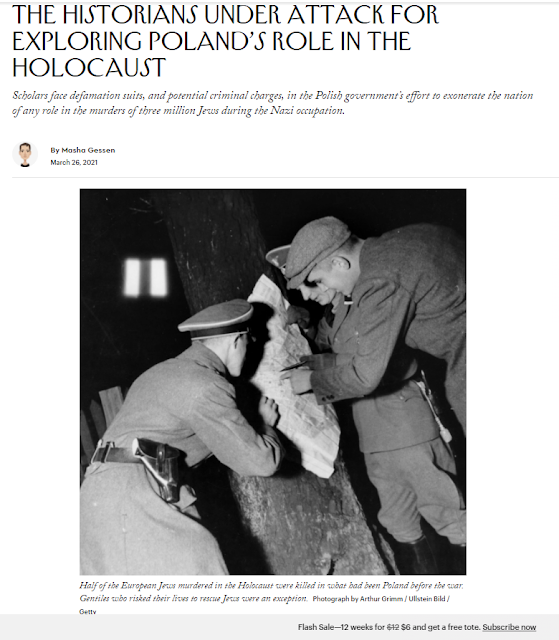 |
| A Dr Catherine Pendergast accuses the Auschwitz Memorial of destroying documents. Again, thanks to Jerzy for alerting me to this. |
Here's a link to the article in the New Yorker
I have not read the article (no time to do so). Can someone read it and offer a summary? And thanks to Jerzy for alerting me to this article.
 |
| A Facebook statement from Gessen. She is a world famous, powerful journalist covering Poland ... and she is completely unaware of , and completely unsympathetic to, how Poles have been stereotyped. No New Yorker writer would ever post something so totally tone deaf about African Americans protesting against their stereotyping. But Masha Gessen and the New Yorker have power and influence and Polonia lacks both. And that responsibility is Polonia's, no one else's. |



The NY article has been partially rewritten, so the situation is similar to the one described in 1984' by Orwell, the Past changes.
ReplyDeleteFrom the article: "Poland's role in the Holocaust". Poland's role started in 1939, when about 100 000 Jewish soldiers defended Poland. Now both some US Jews (Gessen) and Polish nationalists prefer to forget the basic facts. Poland was cancelled and divided by Germany and Soviet Union. Jan Grabowski claims, and Gessen repeats, that German 'Blue' Police was Polish. The Polish state police was dissolved by the Germans in 1939 and thousands of Polish policemen (deputies) were myurdered by the Soviets in 1940 (so called Katyn crime).
ReplyDeleteAnother round of Holocaust-related Polonophobic lies about Poles and Poland. It comes and goes, but never ends.
ReplyDeleteAnonymous, thanks for sharing your thoughts. Please provide a real first and last name. Then I will post your words.
ReplyDeleteHello,
ReplyDeleteMr Pankiewicz mentioned "Maus" comic some time ago. Well, a new comic about the Holocaust was published this year. It's titled "I survived: The Nazi invasion, 1944".
I haven't read it, but from what I've gathered story takes place in fictional town Esties in "Nazi-occupied Poland". Town is populated by Jews and unspecified others. Others "had joined the Nazis in their terror". And local policemen "were even more vicious than the Nazis". The only partisans fighting against Nazis are Jews (called "the Jewish Resistance"). I don't think that Poles as people are mentioned.
I have no access to the book. It has been published in 2014 and is enthusiastically reviewed https://www.amazon.com/Survived-Nazi-Invasion-1944/dp/0545459389
ReplyDeleteApparently there is a new edition with a new cover. It was published in February 2021. Some pages can be found on the Internet. On one page main protagonist is picking blueberries for his sister. Blueberries were introduced in Poland in 1990's.
Deletehttps://www.goodreads.com/en/book/show/52664806-i-survived-the-nazi-invasion-1944
There were no blueberries during WWII. But there were European and bog ones, collected in forests. Another writer has described dandelions as a different, probably American plant.
Deletehttps://www.laurentarshis.com/9-i-survived-nazi-invasion-1944 The picture shows Warsaw Old Town, place of 1944 Uprising.
ReplyDelete